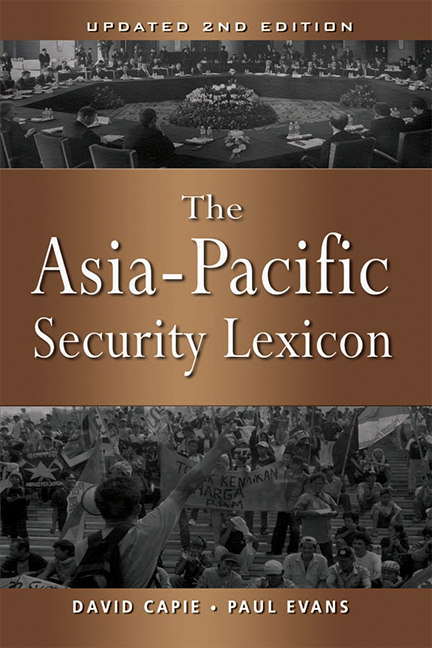Book contents
- Frontmatter
- Contents
- Abbreviations
- Introduction to the Second Edition
- Ad Hoc Multilateralism
- A la Carte Multilateralism
- The “ASEAN Way”
- Balance of Power
- Bilateralism
- Coalition of the Willing
- Coercive Diplomacy
- Collective Defence
- Collective Security
- Common Security
- Comprehensive Security
- Concert of Powers
- Concerted Unilateralism
- Confidence-Building Measures
- Confidence- and Security-Building Measures
- Constructive Intervention
- Cooperative Security
- Engagement
- Flexible Consensus
- Human Security
- Humanitarian Intervention
- Middle Power
- Multilateralism
- Mutual Security
- New Security Approach
- Non-Traditional Security
- Open Regionalism
- Peaceful Rise
- Pre-emption and Preventive War
- Preventive Diplomacy
- Security Community
- Terrorism
- Track One
- Track One-and-a-Half
- Track Two
- Track Three
- Transparency
- Trust-Building Measures
- About the Authors
Flexible Consensus
Published online by Cambridge University Press: 21 October 2015
- Frontmatter
- Contents
- Abbreviations
- Introduction to the Second Edition
- Ad Hoc Multilateralism
- A la Carte Multilateralism
- The “ASEAN Way”
- Balance of Power
- Bilateralism
- Coalition of the Willing
- Coercive Diplomacy
- Collective Defence
- Collective Security
- Common Security
- Comprehensive Security
- Concert of Powers
- Concerted Unilateralism
- Confidence-Building Measures
- Confidence- and Security-Building Measures
- Constructive Intervention
- Cooperative Security
- Engagement
- Flexible Consensus
- Human Security
- Humanitarian Intervention
- Middle Power
- Multilateralism
- Mutual Security
- New Security Approach
- Non-Traditional Security
- Open Regionalism
- Peaceful Rise
- Pre-emption and Preventive War
- Preventive Diplomacy
- Security Community
- Terrorism
- Track One
- Track One-and-a-Half
- Track Two
- Track Three
- Transparency
- Trust-Building Measures
- About the Authors
Summary
A central tenet of the “ASEAN way” or the Asia-Pacific approach to multilateralism. Flexible consensus does not require unanimity on the part of all the members of an organization. According to some accounts, the term was introduced by the former Indonesian President Suharto at the 1994 Asia-Pacific Economic Cooperation (APEC) Leaders' Meeting in Bogor. It is a way of moving forward by establishing what seems to have broad, rather than unanimous, support. Where there is broad support for a specific measure, the objections of a dissenting participant can be discounted, provided the proposal does not threaten that state's most basic interests. The term appears in a number of ASEAN documents. The 1995 Bangkok ASEAN Summit Declaration states that “all ASEAN economic cooperation decisions shall be made by flexible consensus so that Member Countries wishing to embark on any cooperation scheme may do so while the others can join at a later date.”
According to Yoichi Funabashi, in the Bogor Declaration, Indonesia proposed full trade liberalization for all economies in the Asia-Pacific by the year 2020. Malaysia objected and refused to abide by any binding time-frame. Indonesia found a way to get around this by invoking the notion of consensus and carefully distinguishing it from unanimity. While Malaysia did not approve of the use of a formal, fixed deadline, the scheduled target date of 2020 did not threaten its basic interest. Consequently, while Malaysia later announced that it regarded any deadlines for APEC's trade liberalization as only “indicative” and “non-binding”, it had already planned to make the necessary tariff cuts to meet the target date. Thus, in the words of the Pacific Business Forum, flexible consensus allows “economies that are ready to move forward to do so and … other economies, which are not yet ready, to join later”. The process, they claim, promotes “mutual respect” among APEC members. This kind of approach will only work in situations where there are no deep or fundamental differences between members.
- Type
- Chapter
- Information
- The Asia-Pacific Security Lexicon (Upated 2nd Edition) , pp. 131 - 134Publisher: ISEAS–Yusof Ishak InstitutePrint publication year: 2007



